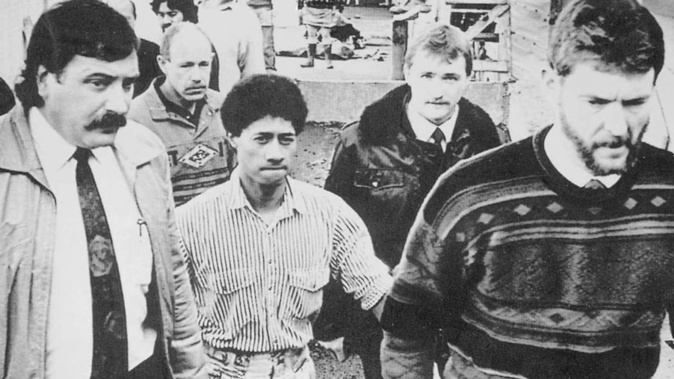
A mass murderer who killed seven people – including three of his young children – has explained why he committed the “horrific” crime.
Raymond Wahia Ratima was denied parole yesterday for the 16th time since being jailed in 1993.
Ratima, who is now aged 57, killed his sons Piripi, 7, Barney, 5, and Stacey, 2, in their grandparents’ home in 1992.
He also killed his brother-in-law Philip Ferguson jnr, 14, his heavily pregnant sister-in-law Nicola Ferguson, 20, her partner Bevan Tepu, 21, and their son Stephen, 3.
He then lay in wait in his in-laws’ darkened home on Judds Rd for his wife, Toni, and her parents, Phillip and Tubby Ferguson, to return home, where he attacked his father-in-law with a softball bat.
He went on the murderous rampage in Masterton after a relationship breakdown.
Ratima was later sentenced to life imprisonment with a non-parole period of 10 years after pleading guilty to seven counts of murder, attempted murder and killing an unborn child.
He was tearful as he spoke to the Parole Board yesterday about missing the people he had killed.
“I’m very sorry and miss them profusely, all of them, the seven members of the whānau whose lives I took,” he said.
One of the board members asked Ratima why he had killed the victims.
“Back then, felt if I can’t have them, no one can have them. It was a very selfish thing, it is one of the most regretful and stupid things.
“I don’t blame any of the victims for having anger towards me for what I’ve done to their families. I still have anger toward myself for what I’ve done to those families,” he responded.
When asked by the board what he was like as a father, Ratima said he and his ex had children very young, with his then-partner being just 14 when she had their first child.
He said he didn’t want his children to grow up with a life of violence, drugs and alcohol.
“I wanted to teach them how to love others and to be loved.”
When asked if he had been able to find any peace over the years, he said, “very slowly”.
“Just all those memories. That horrifying night which keeps coming back at me when I’m just lying in my bed or my dreams, nightmares,” he said.
Board member Greg Coyle noted the victims’ families have been concerned about Ratima changing his story on what happened, including previously saying he hadn’t intended to kill the victims and that he took a knife for his own protection. He has since admitted he did go to the house with the intention of killing them.
 The Judds Rd house in Masterton in which the massacre of seven people by Raymond Ratima (inset) took place.
The Judds Rd house in Masterton in which the massacre of seven people by Raymond Ratima (inset) took place.
“I think it’s me just trying to, I don’t know, make it sound not as horrific as it was,” he explained.
“I believe that I have owned it fully, and I sit here today and own it fully. I have sat in this environment here many times before, and I’ve apologised profusely to all the victims.
“I have sat at parole hearings where I have wept when I’ve spoken about all victims who were taken by my hands. I’ve spoken to family who were at hearings and apologised to them.”
He said he wished nothing but healing for the families of the people he killed.
Panel convener Kathryn Snook said the victims had not changed how they felt about Ratima, and that they did not think he should be released from prison. If he were to be paroled, they wanted him to be banned from the North Island.
At his last parole hearing in March 2024, the board had said they wanted him to complete a programme at a special treatment unit for men with histories of violent offending.
Ratima yesterday said he had declined to attend the programme because of concerns for his safety in that particular unit.
His progress has otherwise been good, according to his lawyer, who said “Mr Ratima’s history now is one of achievement, of good conduct within the prison, responsibility, getting along with the staff and other prisoners”.
While the board has again denied him parole, it has directed that he may apply again in six months. In that time, he is allowed to seek a report from an independent psychologist to provide to the board.
The board is asking for an updated departmental psychological report, which will look at an alternative to the special treatment unit if Ratima is still not willing to attend it.
He will next appear before the board in January.
Melissa Nightingale is a Wellington-based reporter who covers crime, justice and news in the capital. She joined the Herald in 2016 and has worked as a journalist for 10 years.
Take your Radio, Podcasts and Music with you









